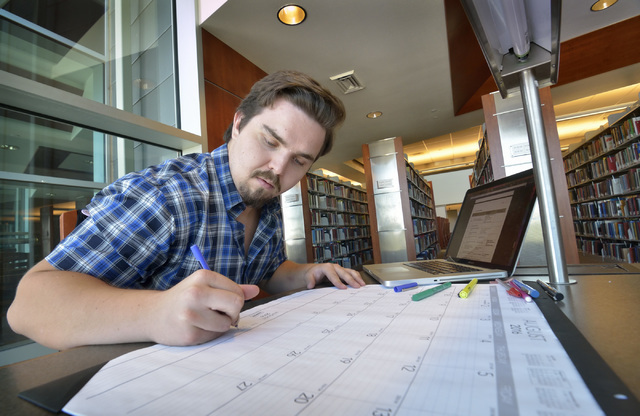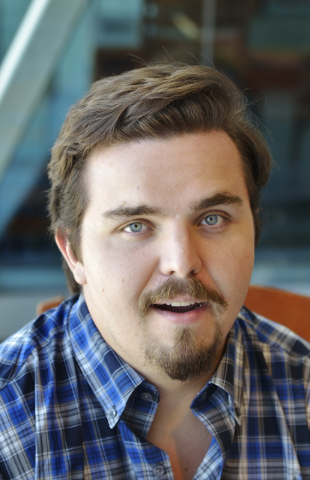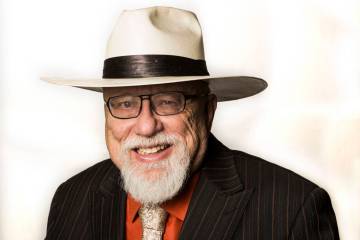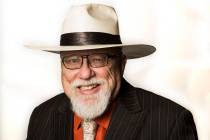UNLV student who almost flunked out learns how to succeed
On Sunday, the day before fall classes began at UNLV, senior Zachary Cabanski laid the groundwork for his graduation this spring.
Working with a large calendar that had a separate page for each month, he entered dates through December when professors for four classes — each already made a syllabus available online — scheduled tests, exams, readings and papers.
Each class was color-coded.
“Now I’m organized and don’t have to keep going back to a syllabus,” he said. “It’s easy to keep everything under control.”
The 22-year-old Cabanski admits he didn’t keep his studies under control his first two years.
He cut too many classes, partied too hard, was disorganized.
In other words, he goofed off, tried to skate by without adhering to the values of hard work and commitment to education that he was raised with.
And he almost got thrown out of school for poor grades.
But he turned his situation around by getting organized, going to class, studying — by falling back on what his parents taught him long ago, that success in America of any kind generally doesn’t come without an education.
Not to plumbers or pediatricians.
Even while employed around 20 hours a week — he works for moving and security companies and as an intramural sports official — Cabanski’s now a regular on the dean’s list and graduating just a year late.
What he wishes, he says, is that he could so easily turn around the kids he’ll ultimately work with.
If all goes as he’s planned, he’ll teach in the Clark County School District in fall 2017. As a special education teacher working in a resource room, he’ll work with largely mainstreamed students who need extra help in certain subjects.
How he wishes K-12 students were fortunate enough to have a background like his.
He had plenty of food. And plenty of discipline.
As an education student, he’s talked with enough teachers and visited enough classrooms to know that some students come to school hungry, which plays havoc with concentration.
“I never had to worry about food,” he said. “My dad was a cop and my mom worked in insurance.”
Cabanski also knows there are students of all economic persuasions who disrupt classes because they aren’t disciplined at home — acting out is all they know. And they’re not all latchkey kids.
“My parents disciplined me when I acted up or was ill-mannered,” he said.
There are also students, Cabanski said, who come to class unprepared because their parents couldn’t care less about education — they approve of their kids watching TV or playing video games instead of doing homework.
That makes it difficult for a teacher to be successful in the classroom.
“No matter how prepared I am as a teacher, so much of my success or lack of it will be out of my control,” he said.
Talk about an understatement.
Officials are working on the decentralization/breakup of the Clark County School District. But no matter how small you make a district, if a student’s commitment to education isn’t there as a result of a lack of family influence or because of abject poverty, it’s well beyond difficult for any paid teacher to actually teach.
I’ve talked to respected district teachers — LaToyshia Parson-Brown and Don Bernard most recently — and they say the lack of positive family influence in a child’s education often spells failure for a child.
What is largely needed to really turn things around — social workers can ensure children have food at school and work to make sure food stamps and pantries are available to families — is not a new curriculum.
It is parents who parent who are most needed — people who teach children that you need an education if you want to succeed.
Hard-working parents who say they’re too tired to do the disciplining necessary to make education a priority for their children must remember their kids didn’t ask to come into this world.
Students must get organized. They must study.
As Cabanski found out at UNLV, there are no shortcuts.
Paul Harasim’s column runs Sunday, Tuesday and Friday in the Nevada section and Thursday in the Life section. Contact him at pharasim@reviewjournal.com or 702-387-5273. Follow @paulharasim on Twitter.
























